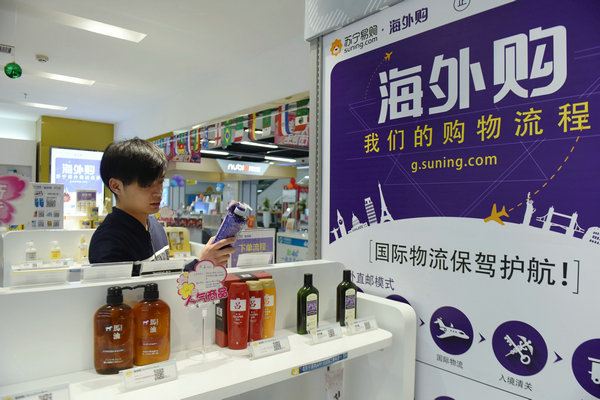New tax rule may cool ardor for cross-border purchases
Updated: 2016-04-22 08:44
By Sun Yuanqing(China Daily)
|
||||||||
 |
|
A customer visits a cross-border e-commerce shop in Hangzhou, Zhejiang province. [Photo by Long Wei/China Daily] |
Luo Tong has been shopping at international online retailers like Shopbop for years now. She usually receives her parcel within a week of her order and has rarely been taxed by customs.
But this time, she has waited three weeks and her parcel still hasn't arrived. Luo's friend, who has been ordering rice powder from Germany, was recently taxed for the first time, she says.
For a long time, Chinese consumers have turned to cross-border e-commerce sites, such as Tmall and JD for lower prices when buying overseas products.
But now the situation is changing as the Ministry of Finance has issued new regulations regarding taxes on cross-border purchases, effective since April 8.
According to the new regulations, personal orders from overseas will no longer be considered personal postal articles that enjoy a relatively low postal tax. Instead, they will now be classified as imported goods and will face tariffs like import VAT and consumption tax.
"I will wait to find out how much tax I have to pay this time and then decide if I should continue to order on these platforms," says Luo.
Cross-border e-commerce has grown rapidly over the last few years. According to the China E-Commerce Research Center, an affiliate of the Ministry of Commerce, the volume of cross-border e-commerce was 2 trillion yuan ($309 billion) in the first six months of last year, a 43 percent increase for the same period in 2014. The consumer trade segment made up 8 percent of the trade last year.
Cosmetics, maternity products, luxury goods, digital products, apparel and electronics were among the most popular items for Chinese consumers.
The new tariffs imposed on personal overseas purchases will reduce the price gap between traditional businesses and e-commerce sites, as well as between domestic and foreign products, Zhang Bin, a researcher on finance and taxation at the top think tank Chinese Academy of Social Sciences, told Xinhua News Agency.
The new regulation will apply to a list of 1,142 goods that include food and beverages, apparel, electronics and cosmetics.
The new tax rule varies depending on the type and price of the products. For food and cosmetics that are priced at less than 100 yuan, the tax has risen, while for clothes and cosmetics costing between 1,000 and 2,000 yuan the tax rates are lower, analysts say.
The new policy also poses challenges to online retailers. The new regulations will raise costs for the platforms and test their global supply chain, which will make it harder for some small players to survive, Tmall's global general manager Liu Peng says.
- As country's population has grown, so has the level of higher education
- Charities rebuild image through relief efforts
- New hiv testing project targets groups most at risk
- Study finds 20-year slump in exercise
- Little champ: Four-year-old roller skates on cliff
- Chinese scientists figure out Zika virus NS1 protein structure
- Ecuador continues recovery efforts following powerful quake
- Beacons and gun salutes as Britain's Queen Elizabeth turns 90
- Queen Elizabeth II's China connections
- Portraits of Queen Elizabeth released to mark her 90th brithday
- Big celebration set for queen's 90th birthday
- Things to know about Queen Elizabeth II
 A 75-year-old kite runner in west China's Shannxi
A 75-year-old kite runner in west China's Shannxi
 $2 million hyper car crash in east China's Zhejiang province
$2 million hyper car crash in east China's Zhejiang province
 Little champ: Four-year-old roller skates on cliff
Little champ: Four-year-old roller skates on cliff
 In pics: Day in the life of a webcasting anchor
In pics: Day in the life of a webcasting anchor
 Top 10 Chinese cities with highest average salaries
Top 10 Chinese cities with highest average salaries
 School 'poisoned' by chemical plants in East China
School 'poisoned' by chemical plants in East China
 Muralist Millo adds color to Shanghai's skyline
Muralist Millo adds color to Shanghai's skyline
 Maze-like bookstore opens new branch in Hangzhou
Maze-like bookstore opens new branch in Hangzhou
Most Viewed
Editor's Picks

|

|

|

|

|

|
Today's Top News
Liang avoids jail in shooting death
China's finance minister addresses ratings downgrade
Duke alumni visit Chinese Embassy
Marriott unlikely to top Anbang offer for Starwood: Observers
Chinese biopharma debuts on Nasdaq
What ends Jeb Bush's White House hopes
Investigation for Nicolas's campaign
Will US-ASEAN meeting be good for region?
US Weekly

|

|









